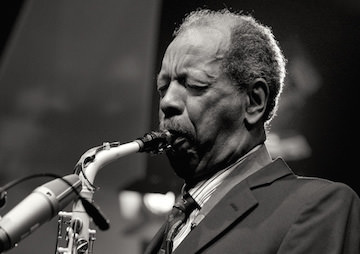Free-Jazz Pioneer Ornette Coleman Dies at 85
Coleman was one of the greats. He didn’t just innovate free jazz, he invented the term. Ornette Coleman in 2011. (Nomo / CC BY-SA 3.0)
Ornette Coleman in 2011. (Nomo / CC BY-SA 3.0)
Alto saxophonist and composer Ornette Coleman died Thursday at the age of 85.
Coleman was one of the greats. He didn’t just innovate free jazz, he invented the term.
“Most major jazz innovators kicked the music forward by solidifying ideas already in the air,” writes author Barry Witherden. “Ornette knocked it sideways into a new groove.”
The Guardian remembers:
Coleman’s greatest breakthrough came in 1959 with his album The Shape of Jazz to Come, a break from the bebop style that had been so influential in the genre, and a landmark in avant garde jazz. His music polarised jazz fans, with reports of people walking out of shows, or arguing at his gigs with fellow audience members.
Coleman, indeed, brought a new vocabulary to jazz, in the widest terms: melody, instrumentation and technique were all taken in new directions in his music. He received the Pulitzer Prize for music in 2007 for his album Sound Grammar.
He unveiled his free jazz direction in November 1959 with a residency at the Five Spot club in New York. Critic George Hoefer wrote in Downbeat of the shows: “Some walked in and out before they could finish a drink, some sat mesmerised by the sound, others talked constantly to their neighbours at the table or argued with drink in hand at the bar.”
At this distance, it is hard to imagine the furore his music provoked, but it was revolutionary at the time. Guardian jazz critic John Fordham wrote of The Shape of Jazz to Come: “Some of it resembled bebop, but of a fragmented, idiosyncratically paced variety. Some of it was hauntingly intense.”
Coleman died in Manhattan of cardiac arrest.
–Posted by Roisin Davis
Your support matters…Independent journalism is under threat and overshadowed by heavily funded mainstream media.
You can help level the playing field. Become a member.
Your tax-deductible contribution keeps us digging beneath the headlines to give you thought-provoking, investigative reporting and analysis that unearths what's really happening- without compromise.
Give today to support our courageous, independent journalists.





You need to be a supporter to comment.
There are currently no responses to this article.
Be the first to respond.